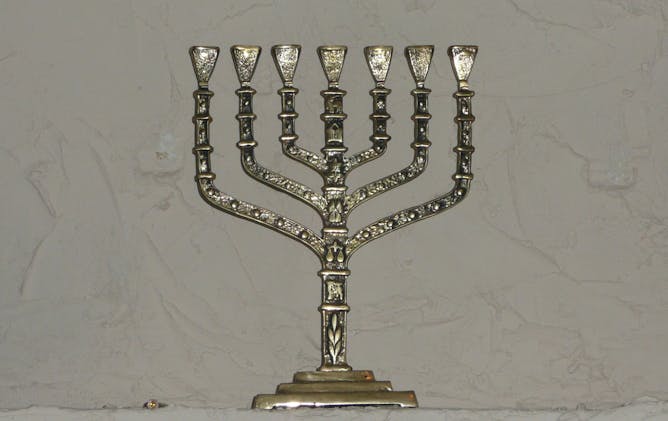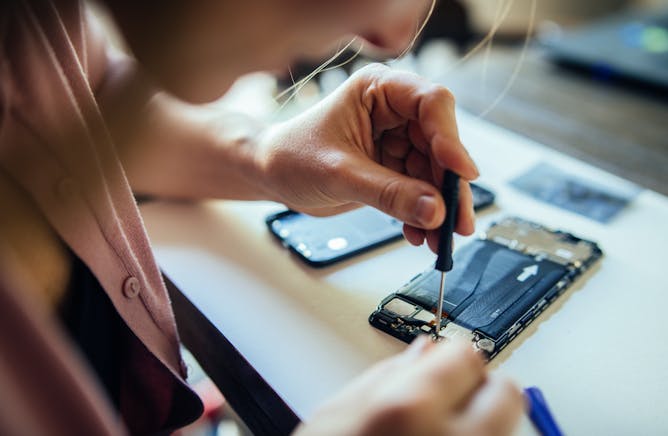|
Do you have trouble sleeping, despite doing all the right things?
You might have tried breathing exercises, calming music, white noise, going to bed in a dark and quiet bedroom, eating different foods in the evening, maintaining a regular sleep pattern, or reducing caffeine. But after three to four weeks of what seems like progress, your insomnia returns. What next?
It’s easy to spend more time in bed, hoping for sleep. It’s tempting to try to get through the days with caffeine and naps. You might have resorted to a wine or two before bedtime.
But none of these work. What does work is a kind of therapy called cognitive behavioural therapy for insomnia (or CBTi for short). This is a four to eight week treatment that works for up to 80% of people. Effects last for at least a year.
As Alexander Sweetman and colleagues write today, it could get expensive, and it doesn’t work for everyone, but it’s more effective than sleeping pills.
This article is the fifth in our series on insomnia. So far we’ve examined the history of insomnia, insomnia in the movies, and whether insomnia is as dangerous for our bodies and our minds as we think. Read the other articles in the series here.
|

|
Anna Evangeli
Deputy Health Editor
|
|

Alexander Sweetman, Flinders University; Jen Walsh, The University of Western Australia; Nicole Grivell, Flinders University
You’ve tried everything to get some sleep, but nothing’s working. Here’s what not to do, and what works.
|

John Hawkins, University of Canberra
Inflation has slipped from 6% to 5.4%, but the price of petrol climbed 7.2% in the September quarter. Much depends on what the RBA thinks will happen from here on.
|

Tim Rock, University of Bath; Matthew Wills, University of Bath
Life on Our Planet has some important messages about the nature of evolution, and what the future may hold for us.
|

Ignacio Cofone, McGill University
Our online data is inevitably intertwined with the data of others. Current protections are ill-equipped to address this reality and manage the far-ranging impacts of data breaches.
|

Daniele Albertazzi, University of Surrey
Even the most firebrand politicians find they need allies when they reach office, and Meloni’s predicaments make that even more true.
|

Daisy McManaman, University of York
The Playboy bunny represents feminine sexuality in it’s most playful and heightened form.
|

Keiran Hardy, Griffith University
Queensland is the latest state bring in laws banning neo-Nazi and far-right symbols, but no one knows yet precisely what will be banned. Here’s how the laws differ across the country.
|

Dennis Altman, La Trobe University
My Life as a Jew is an honest and very personal book about a growing sense of Jewish identity, but it has its contradictions.
|

Professor Johanna Weaver, Australian National University
Cyberspace is a battlefield in modern conflicts – and combatants must follow international humanitarian law to protect civilians.
|

Alexandra Sims, University of Auckland; Trish O'Sullivan, Massey University
Manufacturers have too much legal freedom to sell products that don’t last or are hard to repair. It’s time local law caught up with global efforts to address this environmental and consumer issue.
|

Lily O'Neill, The University of Melbourne; Brad Riley, Australian National University; Ganur Maynard, Indigenous Knowledge; Janet Hunt, Australian National University
Australia’s road to net zero must pass through Indigenous-held land, which is likely to host many clean energy projects. First Nations people want partnerships that help them protect their Country.
|
Politics + Society
|
-
Michelle Grattan, University of Canberra
In this podcast, the Minister for Trade and Special Minister of State Don Farrell joins The Conversation to canvass Australia's prospective trade agreement with the EU, relations with China, and electoral reform
-
Joo-Cheong Tham, The University of Melbourne
The billionaire businessman’s reported dealings with politicians highlight the need to change Australia’s campaign finance laws.
|
|
Health + Medicine
|
-
Matthew Ahmadi, University of Sydney; Emmanuel Stamatakis, University of Sydney
Sedentary lifestyles come with substantial health risks. But even small increases in our daily physical activity may go some way to mitigating these risks.
-
Louise Stone, Australian National University
This week medical leaders met in Canberra to explore why women doctors in Australia are vulnerable to sexual harassment – and to draft a set of safety standards to prevent this in future.
|
|
Environment + Energy
|
-
Hussein Dia, Swinburne University of Technology; Hadi Ghaderi, Swinburne University of Technology; Tariq Munir, Swinburne University of Technology
Support for road-user charging strengthens when people are assured that revenue goes into reducing traffic congestion, maintaining transport infrastructure, improving public transport.
|
|
Arts + Culture
|
-
Ari Mattes, University of Notre Dame Australia
New Australian film Monolith is a refreshingly high concept film, as opposed to the usual social realist and period dramas.
|
|
Business + Economy
|
-
Eu-Jin Teo, The University of Melbourne
Electric vehicle owners appear to have no clear right to a refund despite the High Court determining that the tax charged by Victoria was invalid.
|
|
| |
|
|
|
|
| |
| |

|
| |
| |
| |
Featured Events, Courses & Podcasts
|
View all
|
|
1 January 2023 - 7 October 2026
•
|

|
7 November 2023
•
Sandy Bay
|

|
|
|

|
20 - 21 November 2023
•
Caulfield
|

|
|
|
|
| |
| |
| |
| |
| |
|
|